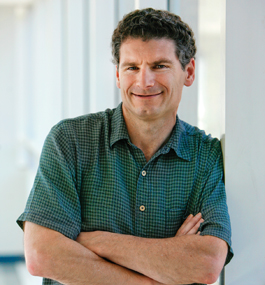A New Scientific Method

Seth Fraden, PhD'87
by Jarret Bencks
Over the past 50 years, science has put a man on the moon, mapped the human genome, eradicated smallpox and created the microchip.
Yet it has not made many inroads into a particular, persistent problem. Nationwide, the percentage of African-Americans, Hispanics and women working in physical science and engineering still falls far below these groups’ representation in the population as a whole — creating a significant barrier to developing the best, most diverse scientific workforce possible.
Now a new kind of scientific collaboration between Brandeis and historically black Hampton University, in Hampton, Va., aims to find a solution. With $3 million in National Science Foundation funding over five years, the universities are launching the Partnership for Research and Education in Materials (PREM) initiative, to bring more underrepresented candidates into university labs and help them advance their careers.
The partnership, which launches in 2016, combines Hampton’s access to a large pool of excellent underrepresented scholars with Brandeis’ broad range of laboratory-science opportunities.
“There are many talented young people who may never know they have an aptitude for research science,” says Raymond Samuel, assistant dean of Hampton’s School of Engineering and Technology. “If they’re never exposed to it, they don’t know they are missing out on it.”
Black students make up just 6 percent of STEM (science, technology, engineering and math) undergraduate-degree recipients, according to the National Center for Education Statistics. And African-American students who enter STEM programs as undergrads are likely to leave the field: According to 2003-09 data, 65 percent either did not receive a degree or switched to a non-STEM program. African-Americans earned a mere 5 percent of STEM doctoral degrees in 2012; 3 percent of STEM doctoral degrees went to black women.
The Brandeis-Hampton partnership includes two programs. One, targeted at fostering students’ interest in research science, will bring Hampton undergrads to Brandeis, expenses paid, to conduct 10 weeks of research through the established undergraduate summer-research program at Brandeis’ Bioinspired Soft Materials Research Science and Engineering Center (MRSEC).
Pathway to Professorship, the second program, will invite Hampton research assistant professors to work for a year in Brandeis labs. The following year, the researchers will continue their work back at Hampton, with the objective of preparing for a tenure-track professorship at either Brandeis or Hampton.
The Brandeis-Hampton partnership will be directed by Samuel; Seth Fraden, PhD’87, Brandeis physics professor and director of the MRSEC; and Deidre Gibson, chair of marine and environmental science, and director of PREM education and outreach at Hampton.
Brandeis is accomplished “in providing the kind of nurturing and commitment to develop great scientists,” Fraden says.
